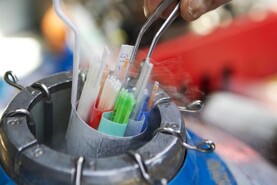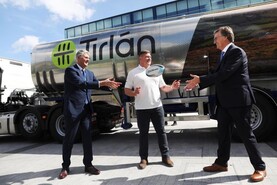For centuries, the Netherlands has led the world with its innovations in agricultural evolution. From the development of the Holstein Friesian cow, to researching the best ways of feeding and milking her; the Dutch have been at the forefront of maximising efficiency in dairying. The exact same can be said of the Dutch pig, poultry and horticulture sectors.
The drive for innovation and intensification saw previous generations of Dutch farmers reclaim land from the sea and travel around the world in search of new farming opportunities. That drive to produce more food increased gears after World War II, and last year agricultural exports from the Netherlands topped €124bn.
Dutch agriculture is no longer at a crossroads. The Netherlands has made the decision to change direction and reduce the intensification of its farmland.
The nitrates derogation is on the way out and the Dutch government is in the process of buying out farmers close to sensitive nature sites, as it tries to arrest some of the decline in the environment caused by the intensification of farming and general industry.
Is this change in direction a moment of prescience for other countries like Ireland, which looks to the Netherlands for inspiration? Can we expect similar moves to reduce the intensity of farming here, despite the fact Ireland is not near as intensive as the Netherlands?
To discuss these issues, the Irish Farmers Journal sat down with the Netherlands’ new ambassador to Ireland Maaike van Koldam and Philip de Jong, the Agricultural Counsellor for the UK and Ireland.
With previous postings in Moscow, Kyiv and Georgia, the leafy suburbs of south Dublin must be a more peaceful residence for van Koldam.
The career diplomat took up the position last September for a three-year term.
With stalemate in Dutch politics (the country is being run by the incumbent caretaker government as a new coalition government is waiting to be formed between four parties), there was much the ambassador was unable to answer, namely future policy direction.
However, she is clear that efforts to reduce pollution and environmental degradation in the Netherlands are set to continue.
“This is a whole of society approach and it’s not just farming that is affected. We need a just transition for those affected, but there are no easy ways out of the problem, particularly with nitrogen pollution,” she says.
There was a direct warning over Ireland’s calf exports, with de Jong saying that many of the veal fattening units are located in parts of the country with high nitrogen pollution.
He explained that farms and industrial units in these sensitive areas have been classified based on their emissions profile and that many calf fattening farms are deemed to be peak emitters and in the crosshairs of the government scheme to buy out their right to farm.
Aside from water quality, the main issue with nitrogen is ammonia pollution.
Ammonia gas is generated where animals are housed and is carried by the wind and then deposited on high nature value areas, leading to biodiversity loss and species decline.
According to de Jong, there is good interest in the retirement scheme, with the highest emitters getting paid 120% of the market value of their phosphate rights.
Between ammonia emissions and new calf transport rules, the Dutch veal sector is facing headwinds.
”I’m not saying all the calf fattening units are going to stop doing business, but I do see it as a challenge for the sector and something to watch, especially as the Netherlands is a destination for so many Irish calves. Plus, there is also strong support among the Dutch public for the changes to the calf transport rules, so this is something that Irish farmers need to be aware of,” according to the agricultural counsellor.
The ambassador says it’s nothing to do with the quality of the Irish calves, but that the Dutch government is supportive of the changes to the transport regulations and that animal welfare is high on the public agenda in the Netherlands.
The lesson for Irish producers – keep the focus on sustainability, or risk Ireland following the Netherlands’ lead
“Food patterns in the Netherlands are changing and people are more focused now on high quality and possibly organic, with the government actively promoting organic farming as an option for farmers and organic food for consumers,” she says.
On the day we met, the second largest retailer in the Netherlands announced it was no longer going to carry price promotions on meat products. This, the ambassador said is a signal that retailers are changing their behaviour around valuing high-quality food, which should benefit farmers.
On trade deals, van Koldam said that while these are negotiated at EU level, there is considerable interest in the Dutch parliament in deals like Mercusor. She said the Dutch are proud of their trading history and to be a founding member of the EU, but that sustainability is a key part of any trading arrangement as the country strives to be carbon neutral by 2050.
With over €1bn of Ireland’s €16bn food and drink exports making its way to the Netherlands in 2023, there are clearly strong trade links between the two countries. The Port of Rotterdam is also the conduit for most of Ireland’s food trade to Africa, Asia and beyond.
With Britain out of the EU, the Dutch have ramped up diplomatic relations with Ireland, with Nuffield scholar and former Carbery farm sustainability adviser Aoife Feeney recruited as a policy adviser.
While the main bulk of trade is within the services sector, ag-tech and renewables are two areas that van Koldam sees huge potential in.
A new honorary consul has also been established working out of Cork, with a clear focus on stakeholders in the off-shore wind business.
The decision to ease off the intensification throttle in the Netherlands looks set to continue.
Whether this is a trend that other countries will follow remains to be seen, but it must be borne in mind that the Netherlands has specific and deep rooted environmental challenges, incomparable to Ireland’s.
With food production in the Netherlands certain to drop as a result of the change in policy, collaborations, like that between Tirlán and Dutch cheese maker Royal A-Ware, are likely to become more common.
The lesson for Irish producers – keep the focus on sustainability, or risk Ireland following the Netherlands’ lead.






 This is a subscriber-only article
This is a subscriber-only article










SHARING OPTIONS: